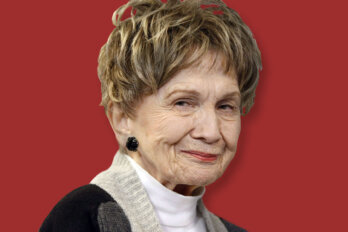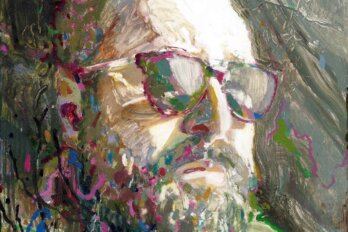For today’s racialized writers, uplift is a hard sell. There are real dangers to celebrating upward mobility, the kind that involves sacrifice, hard work, and investing in the next generation. It’s not that these narratives are implausible but that they are ideologically charged: one person or group’s success can be weaponized against others. Too much optimism gets in the way of denunciations of racism and xenophobia; too much emphasis on personal merit plays into the hands of right-wing ideologues who would rather blame people for their circumstances than tackle structural barriers.
So it’s no surprise, perhaps, that much contemporary literature about immigration tends toward melancholy and tragedy. Souvankham Thammavongsa’s collection How to Pronounce Knife, winner of the 2020 Scotiabank Giller Prize, details the lives of Laotian refugees in Canada. Most of the stories conclude on notes of disappointment. Wajdi Mouawad has examined ties between Lebanon and Quebec; his play Incendies (Scorched, in English) was adapted into an Oscar-nominated film by Denis Villeneuve, of Dune fame, in 2010. Incendies’ unveiling of a family’s history during the Lebanese Civil War is so tragic that it borrows plot points from Sophocles’ Oedipus Rex, incest and all. Even more-upbeat work, like Chimamanda Ngozi Adichie’s 2013 hit, Americanah, usually hedges its bets: Adichie juxtaposes one Nigerian’s relative mobility in the United States with another’s deportation from the United Kingdom.
At first glance, Dimitri Nasrallah’s new novel, Hotline, seems set to follow this trend. It opens with a familiar scene in immigrant fiction: an exhausted protagonist arrives for a job interview. Muna Heddad has recently immigrated from Lebanon, where she taught French, but the schools in 1980s Montreal have no interest in hiring a foreigner. The invisible barriers she runs up against include her own accent, now “an obstacle in every single attempt to find work” as a teacher. She has rent to pay, a young son to raise, and a husband who went missing during the civil war in Beirut. In the elevator to the interview, she begins to “imagine myself anywhere and everywhere in an effort to will the world to bend my way, for once.” This time, it works. She is hired as a phone consultant for Nutri-Fort, a diet company that claims to serve “humanity’s greater desire to self-actualize.” The job is far below her qualifications, but by selling clients on the idea that weight loss will lead to “inner fulfilment,” Muna finally starts to scrape by.
By organizing his novel, in part, around the inspirational discourses that Muna peddles, Nasrallah crafts a collision course between two seemingly antithetical genres: realist immigrant fiction and self-help. The former tends to avoid straightforward takes of progress in favour of social critique, while self-help’s core impulses run in the opposite direction: its “How to” guides usually celebrate individual triumph and promise readers a path to happiness if they follow the recipe. At its worst, the self-help genre falls into the absurdity of Rhonda Byrne’s ubiquitous 2006 book, The Secret. Byrne hyperbolizes the premise of “it helps to have a positive attitude” to portray our thoughts as magic magnets that allow us to manifest our desires. Little wonder so many critics see self-help as wishful thinking—or worse. University of Chicago professor Lauren Berlant, who passed away last year, will probably be best remembered for her 2011 treatise Cruel Optimism. Berlant defines “cruel optimism” as situations where “something you desire is actually an obstacle to your flourishing.” Fantasies of the good life, she argues, have become traps that prevent us from confronting mechanisms of oppression. In a sophisticated reversal of The Secret’s premise, Berlant suggests that most of our dreams are out of reach and believing in them actively hurts us.
One might expect, then, that Muna’s entry into the diet company sets the stage for scathing satire or even a tragic fall. Instead, Nasrallah delivers something far more challenging. He writes a happy ending.
Hotline is, on the surface, a simple story about Muna Heddad’s first winter in Montreal. Given the immigrant framework of the plot, it’s not surprising that she is made to live in a depressing one-bedroom or that she accepts the role at Nutri-Fort out of desperation, admitting, “I’m landing very far away from where I wanted to land.” But both details are also justified by autobiography. Nasrallah came to Montreal with his family in the 1980s, and the novel’s narrator is a fictionalized version of his mother, who worked for a weight-loss centre. The choice to use real life as fictional fodder is one the writer, in an interview with the Montreal Gazette, describes as “strangely freeing.” The declaration is ripe for psychoanalysis. One can imagine the novel as a form of therapy: Nasrallah admits elsewhere that he “felt ignored, abandoned” during those early years in Montreal. Adopting his mother’s perspective could be a way of recontextualizing his childhood. The pitfalls of maternal reverence are also in evidence. Muna’s erotic life is muted and matrimonial, for example, and she never resents her son. But this freedom may also be at the level of genre and ideology. If matters gradually improved for the Nasrallahs, why shouldn’t they for Muna? Why should he kill his mother when she did not die? (In the novel, he does kill his father and delete his younger sister from the family, but we’ll leave that to Freud.)
What makes the novel truly clever is Nasrallah’s choice to engage the language of self-help directly. Her employer sells boxed meals with set calorie counts, and Muna’s job is to sign up new customers and follow up with subscribers. It’s a sensitive position that requires intruding into the private lives of lonely suburbanites as they reveal why they gained weight in the first place. Soon, she finds herself spouting phrases like “You need to have some faith in yourself and your goals.” Such moments allow Nasrallah to subvert self-help’s hyperbole without discarding the narrative of resilience he is building.
Muna is acutely aware of the paradox in her position. “Given what I have lived through,” she observes, “it’s ironic that I must now spend my days taking confessions through a phone to be paid a commission for each call and repeat business.” The product she sells is also of dubious quality. A med student in her building advises her to stop giving the meal boxes to her son as they have too little nutritional content. Overall, the call-centre job is portrayed as undesirable, with high turnover among employees, and throughout the depictions of her workplace, there is an undertow of critique about the way capitalist structures exploit loneliness for profit.
At the same time, Muna makes the best of her situation. She gives genuinely good advice as her conversations with clients move from food to managing abusive relationships or reconnecting with the outside world after the death of a parent. Her commission cheques grow. She breaks a sales record and is eventually offered a promotion to assistant manager, complete with stock options and a private office. Some of her success at Nutri-Fort is attributed to the very accent that keeps her from teaching. In a backhanded compliment, her manager comments, “It’s almost as if . . . as if talking to you doesn’t count.” Over the course of the year, her perseverance attracts other good things: a kindly landlord who gives her leftover furniture, a return to teaching through a circle of Chinese immigrants, a better apartment after an arduous search. She does not magically manifest everything she wanted in Montreal, but her life does, in fact, improve.
While self-help has been around for a century or more, its invasion of literary fiction is arguably a feature of the 1990s, when a thin Brazilian novel found a global audience by telling everyone to follow their “Personal Legend.” First published in 1988, Paulo Coelho’s The Alchemist, a watered-down New Age fable about a shepherd travelling through the desert, was translated into English in 1993 and went on to sell over 150 million copies in at least eighty languages. Few academics have found much merit in its clichés. When an article in the New York Times labelled The Alchemist “more self-help than literature,” the insult was clear.
Yet Harvard assistant professor Beth Blum argues that the relationship between literary fiction and self-help—those “historically ambivalent shelf-fellows”—has evolved into something more positive in recent years. In her 2020 book, The Self-Help Compulsion, she details an increasing number of contemporary writers who engage with the format and language of inspirational literature as “a vehicle for posing meaningful questions about how to most fully inhabit and savor the present.” Works like Mohsin Hamid’s How to Get Filthy Rich in Rising Asia endorse aspects of motivational discourse while “documenting the success ethic’s pernicious, even tragic, effects.” Her examples do not necessarily end happily: Hamid’s book maintains its critical edge by concluding with financial ruin and death. But Blum’s work suggests that Nasrallah is part of a larger movement that plays with inspirational rhetoric rather than dismissing or attacking it.
In an interview with Canadian Notes and Queries, Nasrallah discusses the significance of resilience in immigration stories. “People succeed despite the system. That’s the part about the human spirit I find most noble.” In this vein, Hotline underlines the importance of believing that success is possible. Near the close of the novel, Muna flirts with the idea that the universe responds to her desires. “There have been moments when, if I’m searching for guidance and I’m desperate enough for an answer, the fabric of circumstance will reach out to me and offer me a signal, subtle and imperceptible to everyone but me, a gift.” The message sounds awfully similar to the core mantra of The Alchemist, which insists, “When you want something, all the universe conspires in helping you to achieve it.” But, a few pages later, Muna doubles back to recognize contingency. She observes a sunset from her new apartment, which feels like a personal reward, but she knows logically that “there’s nothing about this world that’s bending to please me in particular.” Nasrallah carves out an intermediate space for his protagonist where she believes just enough in cosmic generosity to keep trying. In contrast to Berlant’s cruel fantasies that cloud our judgment, Muna toys with a few convenient illusions that make her daily life more livable.
Thankfully, some of today’s bestselling self-help titles are relatively sane: one recent multiyear chart topper is Mark Manson’s The Subtle Art of not Giving a F*ck, a backlash against excessive positivity within the genre itself. Likewise, Hotline suggests that immigrant literature may be able to navigate its own course between the Scylla of despair and the Charybdis of naïveté. The problems of bootstraps narratives aside, happy endings are still worth writing. Because sometimes, despite the systemic injustices that plague experiences like immigration, people find ways to move forward and be more or less okay. And that is allowed to happen in fiction too.






